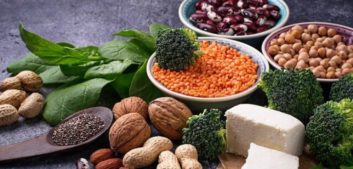.
.
.

Proteins are essential for muscle rebuilding and recovery.
We’re all familiar with animal proteins, but the subject of plant proteins is more complicated.
Yet plant proteins are rich and can be found in many different types of food.
Let’s take a look at 7 super sources of plant protein.

1. Spirulina: 65g of protein per 100g of spirulina
Spirulina is an ideal food supplement for vegans, containing the highest level of plant proteins.
At 65% protein, it contains more protein than meat and fish.
It also contains all the essential amino acids.
There are various ways to consume spirulina, but the most pleasant way is in tablet form with a meal.
2. Chia seeds: 17g of protein per 100g
Chia seeds are classified as “superfoods”.
Not only are they rich in protein, they also contain plenty of fiber and omega 3.
They can accompany both savory and sweet dishes, and their taste is not strong at all.
3. Chickpeas: 19g of protein per 100g
Chickpeas are part of the legume family, and are rich in protein, as well as magnesium, plant calcium and fiber (for better digestion).
The other great thing about chickpeas is that they reduce bad cholesterol levels.
4. Almonds: 21g of protein per 100g
Almonds are an oleaginous dried fruit, and a good source of protein.
Thanks to their high magnesium content, they help you stay in better shape.
What’s more, they contain vitamin E, which helps reduce oxidative stress, responsible for the premature ageing of our cells.
Finally, their unsaturated fatty acid content makes them a good source of lipids.
5. Hemp seeds: 26g of protein per 100g
Hemp seeds are the richest in vegetable proteins.
And their strong point is that they are not only rich in protein quantitatively, but also qualitatively, since they contain all the essential amino acids not naturally synthesized by our bodies.
6. Seitan: 23 grams of protein per 100g of cooked seitan
Seitan is called “plant meat” because it’s a good source of plant protein, rich in essential amino acids.
Cholesterol-free and very low in fat, it is recommended for athletes who want to watch their weight.
The texture is similar to that of meat, and seitan can easily replace it in many classic recipes.
7. Tofu: 18 grams of protein per 100 grams of tofu
Tofu is the classic vegan food.
Made from soy, it is rich in protein, vitamins and nutrients.
It contains vitamin A, vitamin B, vitamin D and vitamin E.
It’s very easy to cook. Simply pan-roast it with herbs and the sauce of your choice, and it pairs perfectly with seasonal vegetables.
